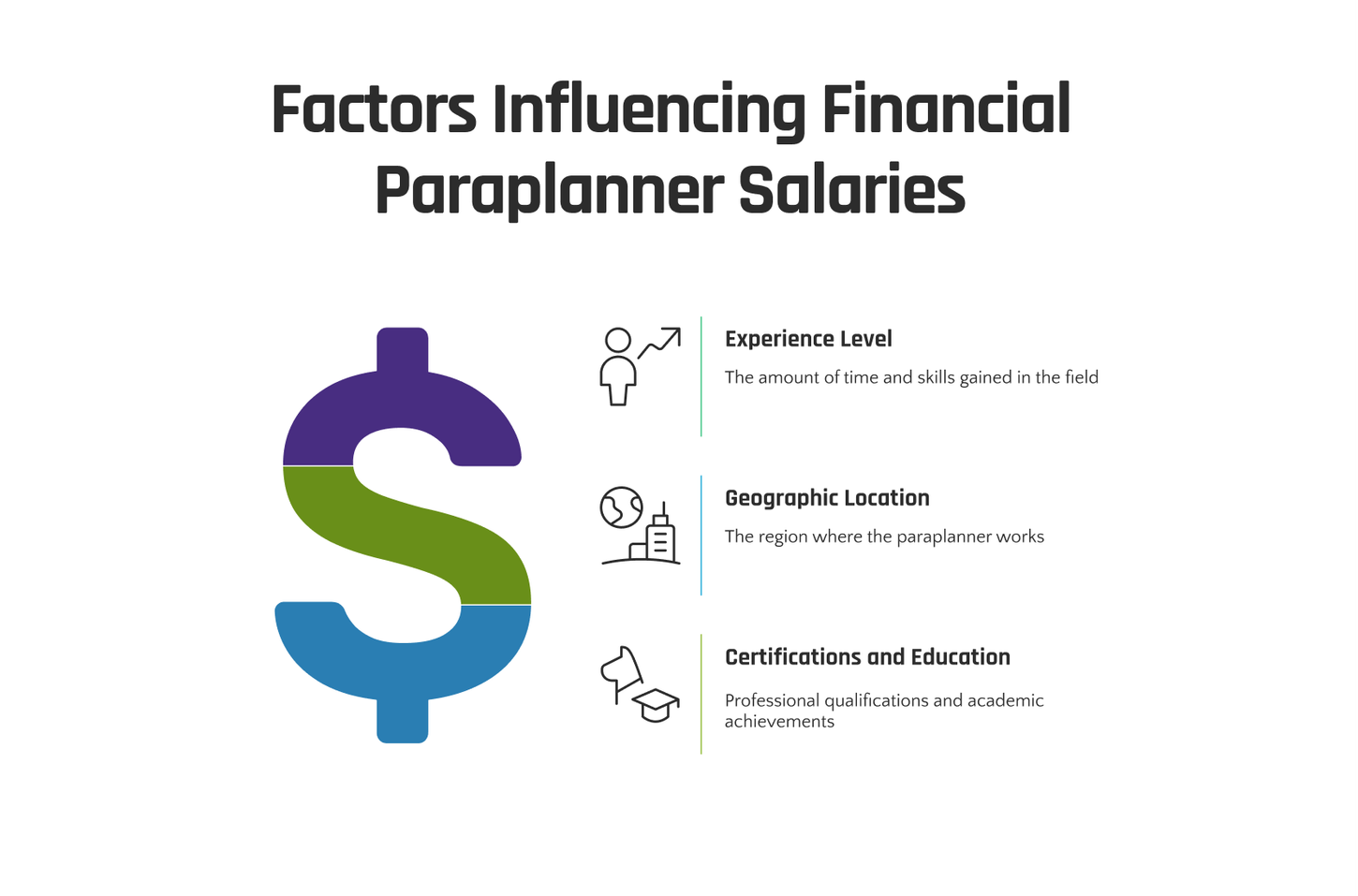Wondering about a career as a paraplanner? The average paraplanner salary is something many people look into. This post will show you what to expect in terms of pay, and how different factors affect it.
Key Takeaways
-
Financial paraplanners have an average salary of $51,500. This can change based on experience, location, and education.
-
Certifications like the Certified Financial Planner (CFP®) can increase a paraplanner's salary by 29%.
-
Top cities like San Francisco offer higher salaries, up to $75,000 for financial paraplanners.
-
High-paying related jobs include financial advisor and wealth manager. These can offer more money and chances to grow in your career.
-
Getting CFP® certification is a good move. It leads to better job opportunities and higher pay.
Average Financial Paraplanner Salary
The national salary range for financial paraplanners varies. Their hourly wage can be broken down based on several factors, such as experience level and geographic location.
National salary range
Financial paraplanners play a crucial role in helping financial planners assist their clients. Knowing what salary to expect in this career can guide you as you advance.
| Position | Lowest Salary | Highest Salary | Average Salary |
|---|---|---|---|
| Financial Paraplanner | $38,500 | $65,000 | $51,500 |
Salaries vary widely based on several factors. These include your experience level, where you live, and your education. Cities with high costs of living often offer higher salaries. Adding certifications can also boost your pay.
Hourly wage breakdown
Shifting from the national salary range, let's explore the hourly wage breakdown for financial paraplanners. Knowing how much you could earn per hour can help you understand what to expect in this career. Here's a detailed look at the hourly wages for financial paraplanners.
| Experience Level | Hourly Wage |
|---|---|
| Entry-Level | $15-$20 |
| Mid-Level | $20-$30 |
| Experienced | $30-$40 |
Factors Influencing Financial Paraplanner Salaries

Factors affecting financial paraplanner salaries include experience level, geographic location, and certifications and education. These elements can significantly impact the earning potential in this career field.
Geographic location alone can contribute to varying salary ranges for financial paraplanners across the country.
Experience level
Experience level plays a big role in how much financial paraplanners make. People just starting out earn less than those who have been working for several years. As paraplanners gain experience, they start handling more important tasks.
They help with retirement planning, manage client meetings, and prepare financial reports. With each year, they learn new skills that help them do their job better.
A paraplanner with lots of experience might move up to a higher position in the company. This means they could become financial advisors or take on management roles. The more experience they have, the more money they can make and the bigger projects they get to work on.
With time and experience come greater opportunities and higher pay in the financial services industry.
Geographic location
Transitioning from experience levels to geographic location, the financial paraplanner salary can vary based on where you work. For instance, paraplanners in larger cities generally earn higher salaries due to the higher cost of living and demand for their services.
The average annual salary for a financial paraplanner in New York City is around $62,000, whereas in a smaller city like Omaha, it's approximately $52,000. Factors such as regional demand for financial services and the local economy play significant roles in determining salary ranges.
Therefore, when considering a career as a financial paraplanner, it's essential to account for how your geographic location may impact your earning potential.
Certifications and education
Moving from geographic location to certifications and education, it's important to understand that these play a key role in determining financial paraplanner salaries. Obtaining a bachelor's degree related to the financial industry is valuable, and additional certification like Certified Financial Planner (CFP®) can significantly boost earnings.
For instance, professionals with CFP® certification see an average salary increase of 29% compared to those without it. Similarly, gaining experience through internships or industry training programs can also enhance earning potential for paraplanners.
Financial planning firms often look favorably upon candidates with advanced degrees such as masters or those who have completed specialized courses offered by college for financial planning.
In fact, according to the Bureau of Labor Statistics, paraplanners who hold professional certifications tend to earn higher salaries than those who do not possess them. Therefore, pursuing further education and obtaining relevant certifications should be considered as strategic steps toward increasing one’s earning potential in this field.
Top Paying Cities for Financial Paraplanners
Financial Paraplanners can expect varying salaries across the United States. Here's a look at the top paying cities:
| City | Average Salary |
|---|---|
| San Francisco, CA | $75,000 |
| New York, NY | $70,000 |
| Boston, MA | $68,000 |
| Seattle, WA | $65,000 |
| Washington, DC | $63,000 |
Cities like San Francisco and New York lead with the highest average salaries for Financial Paraplanners. Salaries in these cities are on the higher side due to the cost of living and the demand for skilled financial planning professionals. Now, let's shift our focus to the best paying related jobs in the U.S.
Best Paying Related Financial Paraplanner Jobs in the U. S.
Financial paraplanners with experience and relevant certifications can find high-paying related jobs in the United States. Some of these positions include financial advisor, financial analyst, investment advisor, wealth manager, and retirement planning consultant. These roles offer competitive salaries and opportunities for career growth within the financial services industry. Individuals interested in pursuing a financially rewarding career as a paraplanner should explore these related job options to leverage their skills and expertise for greater earning potential.
Please note that incorporating CFP® certification or other specialized qualifications can further enhance one's prospects for securing top-paying financial paraplanner jobs in the U.S., particularly in major metropolitan areas.
Benefits of Earning CFP® Certification
Earning CFP® certification creates opportunities for higher-paying jobs in the financial planning industry. On average, CFP® professionals earn 25% more than their non-certified counterparts.
This certification equips professionals with advanced knowledge and skills, enhancing their ability to serve clients in various capacities. It also provides valuable experience through a comprehensive curriculum covering important aspects of finance, insurance, risk management, and more.
Furthermore, possessing the CFP® title not only leads to enhanced career opportunities but also unlocks the potential for higher earnings and career advancement within the industry.
Career Advancement Opportunities for Paraplanners
Paraplanners can advance their careers by acquiring industry-recognized certifications such as the Certified Financial Planner (CFP®) designation, which can lead to higher-paying positions and more responsibilities in financial planning firms.
They can also pursue further education or specialized training in areas like estate planning or investment management to broaden their skill set and marketability. Networking and seeking mentorship from experienced professionals in the field can provide valuable insights and opportunities for career growth.
Moreover, gaining experience working with a diverse range of clients and taking on leadership roles within the company can pave the way for promotions into higher-level positions.
Conclusion
Financial paraplanner salaries can vary based on factors like experience, location, and certifications. The potential for higher pay is notable in top cities and related financial roles.
Earning a CFP® certification can bring benefits to a paraplanner's career. There are opportunities for advancement and professional growth in this field. Understanding salary expectations is an essential part of planning your career as a paraplanner.
FAQs
1. What is a paraplanner's role in a financial services career?
A paraplanner provides support to financial advisers by doing administrative tasks like organizing client records, taking notes during client interactions and handling clerical duties.
2. Where do paraplanners work?
Paraplanners can work in various settings from independent planners to boutique style firms or as internal paraplanners within larger businesses.
3. How does the role of a Paraplanner differ at an independent firm versus a house office?
At an independent firm, paraplanners often have more direct contact with served clients and may handle higher level position tasks. In-house or internal paraplanners usually focus on administrative duties such as managing client files and other clerical tasks.
4. Is industry experience important for the career of a Paraplanner?
Yes, industry experience is crucial for professional development in this field as it helps them understand the business better, manage new clients efficiently and perform their duties effectively.
5. Can being a Paraplanner be considered as stepping stone to other roles within the financial sector?
Absolutely! The skills gained while performing the responsibilities of organizing client records, providing support to financial planners among others could serve as valuable experience towards advancing into higher positions within accounting or finance sectors.
6. Do Paraplanners need any specific qualifications or education background?
While there are no strict educational requirements for becoming a paraplanner, having knowledge about finance obtained through formal education or practical experiences would definitely be beneficial.



